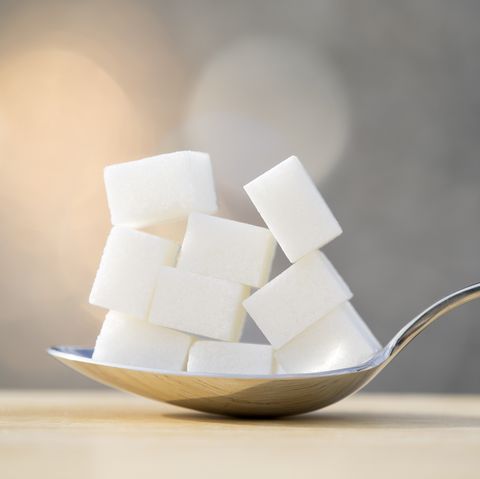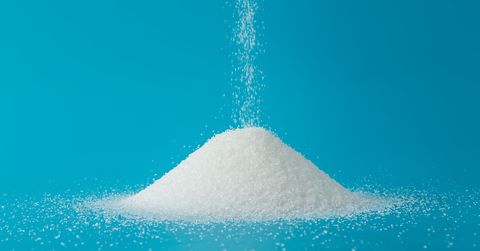

Studies show that people who eat too much sugar have an increased risk of high blood pressure, poor cholesterol, and elevated levels of inflammation, a root cause of many chronic conditions.
But, HOLD UP, before you start going through your fruit basket and tossing your apples and bananas, hear me out.
The natural sugars found in fruit (fructose) and dairy (lactose) are not problematic. It’s added sugar: the white, brown, and syrupy stuff that is incorporated into foods during processing.
You’re probably thinking, “Why are natural sugars OK?” Well, for one, it’s pretty hard to eat so much natural sugar that it’s detrimental. There’s only so much fruit and dairy you can put down.
Second, those natural sugars are tucked in foods that are also brimming with good-for-you vitamins and minerals. Fruits and vegetables also contain disease-fighting antioxidants and fiber, that super-important nutrient you’re probably not eating enough of.
How many grams of sugar should you have in a day?
That depends who you ask.
The American Heart Association says men should eat no more than 9 teaspoons of added sugar (or 150 calories, or 36 grams) and women should cap their daily amount at 6 teaspoons (that’s also 100 calories or 25 grams). The World Health Organization and the U.S. government’s dietary guidelines are slightly more liberal: added sugars should take up less than 10 percent of your daily calories. For an adult that’s about 50 grams or 12 ½ teaspoons. To put all this in perspective, one 12-ounce can of Pepsi has 41 grams of added sugar.

Getty ImagesWachara Kireewong / EyeEm
Confused? Here’s what I tell my clients: Don’t worry about the number. Trying to keep track of your added sugars will make you go nuts. Just cut back. Many nutrition facts panels now include a line specifically for added sugars. Make sure you’re seeking out this information. Then, for maximum benefit, start swapping out products in your diet that are higher in added sugar (like that soda) with a low- to no-sugar alternative (such as flavored seltzer, for example).
And despite what you might read out there on the interwebs, sugar is sugar is sugar. Yes, sweeteners like maple syrup and honey may deliver slightly more antioxidants than the granulated stuff, and agave is lower on the glycemic index, but they’re all still sugars and our body essentially processes them all the same.
Now, what I’m about to say might surprise you, especially given that I’m a registered dietitian.
Think twice before you stop eating all added sugar.
For one, banning an ingredient or food from your diet can backfire and end up making you crave it more. But sugar is also essential in great cooking. It keeps breads and baked goods tender. It marries salty, sour, and acidic flavors. Ditch it entirely and your food won’t taste as great, which means you may be less likely to enjoy meals you make yourself.
And that’s key: Cook a little more often and you’ll naturally curb how much sugar you’re eating. Even if you’re using a little sugar in your cooking, it’ll be far less than what you’d likely be consuming from a packaged or restaurant meal.
Source: Read Full Article